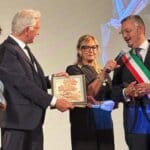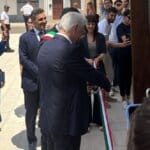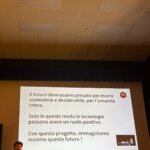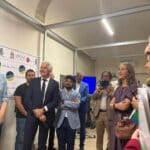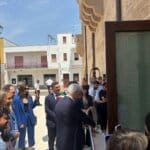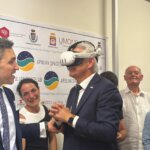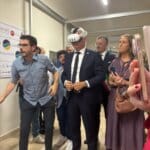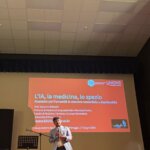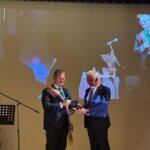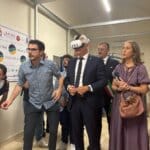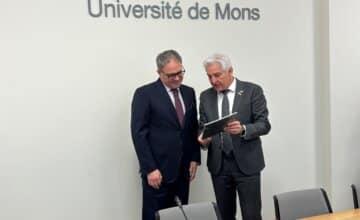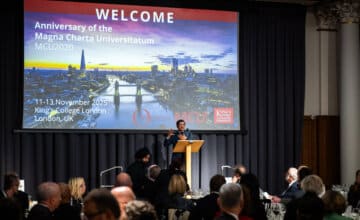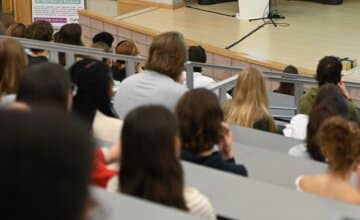Launch of the Apulian SpaceLab in Italy: UMONS affirms its role as an active partner in aerospace research and innovation
 Could the future of space exploration also unfold underwater? At the crossroads of science, innovation, and academic diplomacy, the Apulian SpaceLab embodies a bold ambition: to explore the limits of the human body in space-analog conditions… while remaining on Earth.
Could the future of space exploration also unfold underwater? At the crossroads of science, innovation, and academic diplomacy, the Apulian SpaceLab embodies a bold ambition: to explore the limits of the human body in space-analog conditions… while remaining on Earth.
“This is a first in Europe, commented Professor Philippe Dubois, Rector of UMONS. The idea is to investigate the effects of weightlessness on human behavior, particularly neurological and vestibular responses. Very little is known in this field, even on Earth. Being able to study it in microgravity will significantly advance research in this area,” he added.
Coordinated by UMONS through its Faculty of Medicine and Professor/Dr. Giovanni Briganti (scientific coordinator), the university is particularly proud to be part of this endeavor, alongside the University of Antwerp, the Saint-Luc University Clinics (UCLouvain), and two Italian universities. These institutions will benefit from a network of renowned international researchers.
“The Apulian SpaceLab also presents an opportunity for our department, via Dr. De Siati—a doctoral researcher—to broaden its fields of expertise and engage in bilateral collaborations with a region rich in opportunity. Personally, my contribution will involve applying complex analysis methods, especially AI, to uncover relationships between clinical data from the simulations,” added Professor/Dr. Giovanni Briganti.
More broadly, the Apulian SpaceLab is fueled by a strong spirit of international cooperation. It is the result of a partnership between the municipality of Maruggio (which provides the site), the Department of Computational Medicine and Neuropsychiatry at UMONS, the Italian Embassy in Belgium, and key stakeholders such as the Italian Army, the European Commission, and the regional government of Apulia, which co-finances the project.
Concretely, the Apulian SpaceLab aims to study the neurophysiological and vestibular responses of the human body in simulated microgravity environments, while fostering close collaborations with major European space agencies such as the European Space Agency (ESA) and the Italian Space Agency (ASI).
The SpaceLab comprises two complementary platforms:
- A terrestrial center, equipped with high-tech clinical devices and virtual reality simulation environments (see photos below), enabling precise experimentation on sensorimotor functions.
- An underwater marine station, designed to closely replicate conditions of isolation, pressure, and confinement similar to those of a space capsule—intended for extended analog missions.
Before the official ceremony on June 17, activities began the previous evening with a gala attended by Federica Favi, the Italian Ambassador to Belgium; UMONS Rector Professor Philippe Dubois; Professor Giovanni Briganti, Head of the Department of Computational Medicine and Neuropsychiatry; Maruggio’s Mayor Dr. Alfredo Longo; and members of the SpaceTeam including Professor Floris Wuyts and Doctors Michel Debue and Daniele De Siati.
The next day, the official ceremony took place at the Cine-Teatro “Impero” in Maruggio, in the presence of the same guests and representatives of regional, national, and European institutions. Attendees included authorities from Apulia and senior military officials from Rome. Isidro Laso, Senior Officer at the European Innovation Council (EIC), delivered a speech, followed by remote contributions from MEPs Gori, Picaro, Ventola, and Palmisano, who joined from Strasbourg.
After the speeches, participants visited the SpaceLab headquarters for the ribbon-cutting of the terrestrial laboratory (see photos below). A guided tour showcased several technologies, including a multi-axis gyroscope and a virtual reality system for neurovestibular simulation of suborbital flights, presented by the scientific team. The morning concluded with a networking lunch in the cloister of Maruggio’s Town Hall.
Professor Philippe Dubois, Rector of UMONS, used the opportunity to highlight “the inestimable value of international partnerships in advanced scientific research,” emphasizing that “global challenges require cross-disciplinary expertise and shared visions.”
Dr. Daniele De Siati outlined the vision of the Apulian SpaceLab: “The SpaceLab revolves around five pillars: advanced medical research in collaboration with space agencies; support for innovation among technology-sector companies; promotion of tourism in the region; science outreach for schools and the general public; and re-engagement with talents trained abroad. This laboratory aims to become an open space that can partially bring back expertise that has left and root an ambitious, shared vision of science here in our region. The coordination provided by the University of Mons plays a central role in ensuring the project’s scientific robustness and achieving its goals, in partnership with the Universities of Bari and Modena and Reggio Emilia.”
For her part, the Italian Ambassador to Belgium, Federica Favi, emphasized the central role of science diplomacy in fostering sustainable bilateral relations and high-impact projects. She recalled that the idea for the Apulian SpaceLab was born in 2022 during an event organized by the Italian Embassy in Brussels, which promoted dialogue among universities, businesses, and institutions: “Speaking at the inauguration of the Apulian SpaceLab is an opportunity to witness the tangible results of our scientific diplomacy at the service of Italy, Europe, and our future. I thank the Italian researchers in Belgium for bringing back to their region of origin—Apulia—a forward-looking project that, alongside the Grottaglie spaceport, will create major opportunities for scientific and economic growth in the region and Italy as a whole,” she declared.
Preparing for Future Suborbital Flights
These new facilities will help prepare for future human suborbital flights. They also offer concrete benefits for Earth-based medicine, notably in treating conditions related to balance, sensory disorientation, or neuromotor rehabilitation.
“There will soon be short-duration suborbital flights that allow several minutes in weightlessness, making it possible to conduct much more in-depth studies,” explained the Rector of UMONS.
The Apulian SpaceLab exemplifies UMONS’ growing engagement in high-value-added research projects that respond to societal needs and technological innovation challenges.
“We believe that interdisciplinary and international research is the key to tomorrow’s innovation,” affirmed Rector Philippe Dubois, who also referenced UMONS’ involvement in the European University Alliance EUNICE and numerous industrial partnerships through its UMONS Innovation Centers network.
A Showcase for Science, Innovation, and Academic Diplomacy
Beyond its scientific purpose, the Apulian SpaceLab also aims to become a hub of attraction for schools, universities, and the general public through science education and training initiatives.
The June 17 event concluded with a symbolic gesture: the official presentation of the University of Mons medal to Maruggio’s Mayor, Dr. Alfredo Longo, sealing a long-term cooperation between the two partners.
“I firmly believe that our collaboration represents an extraordinary opportunity for academic, cultural, and human growth for many European students,” said Dr. Alfredo Longo.
Through its involvement in the Apulian SpaceLab, the University of Mons affirms its leadership role in the biomedical research of tomorrow.
By combining scientific excellence, technological innovation, and societal engagement, this project marks a decisive milestone in the exploration of human limits, on Earth and in space.


